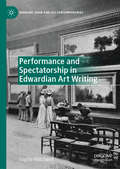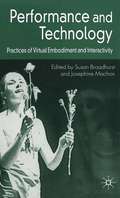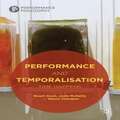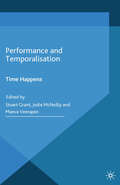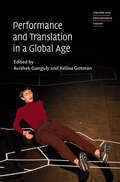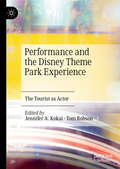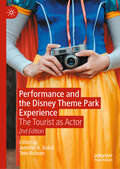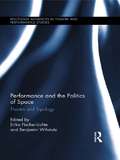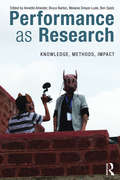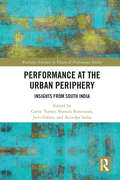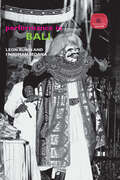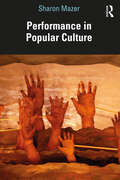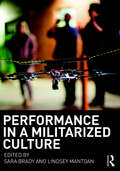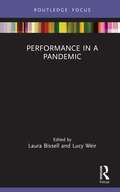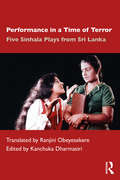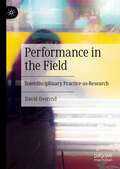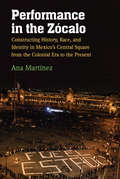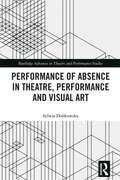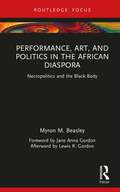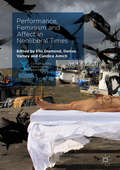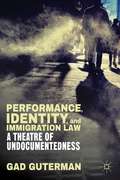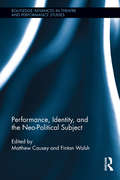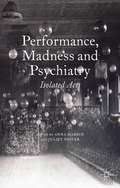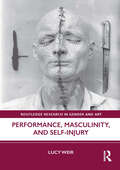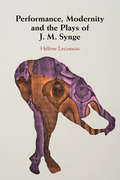- Table View
- List View
Performance and Spectatorship in Edwardian Art Writing (Bernard Shaw and His Contemporaries)
by Sophie HatchwellThis book explores how Edwardian art writing shaped and narrated embodied, performative forms of aesthetic spectatorship. It argues that we need to expand the range of texts we think of as art writing, and features a diverse array of critical and fictional works, often including texts that are otherwise absent from art-historical study. Multi-disciplinary in scope, this book proposes a methodology for analyzing the aesthetic encounter within and through art writing, adapting and reworking a form of phenomenological-semiotic analysis found conventionally in performance studies. It focuses on moments where theories of spectatorship meet practice, moving between the varied spaces of Edwardian art viewing, from the critical text, to the lecture hall, the West End theatre and gallery, middle-class home, and fictional novel. It contributes to a rethinking of Edwardian culture by exploring the intriguing heterogeneity and self-consciousness of viewing practices in a period more commonly associated with the emergence of formalism.
Performance and Technology: Practices of Virtual Embodiment and Interactivity (Palgrave Studies In Performance And Technology Ser.)
by Susan Broadhurst Josephine MachonThis collection interrogates the interaction between new technologies and performance practice, linking the sensuous contact that must exist between the physical and virtual, together with the resultant corporeal transformation. It features writings from international contributors who specialize in digital art and performance practices.
Performance and Temporalisation
by Stuart GrantPerformance and Temporalisation features a collection of scholars and artists writing about the coming forth of time as human experience. Whether drawing, designing, watching performance, being baptised, playing cricket, dancing, eating, walking or looking at caves, each explores the making of time through their art, scholarship and everyday lives.
Performance and Temporalisation: Time Happens (Performance Philosophy)
by Jodie McNeilly Maeva VeerapenPerformance and Temporalisation features a collection of scholars and artists writing about the coming forth of time as human experience. Whether drawing, designing, watching performance, being baptised, playing cricket, dancing, eating, walking or looking at caves, each explores the making of time through their art, scholarship and everyday lives.
Performance and Translation in a Global Age (Theatre and Performance Theory)
by Kélina Gotman Avishek GangulyPerformance and the Disney Theme Park Experience: The Tourist as Actor
by Jennifer A. Kokai Tom RobsonThis book addresses Disney parks using performance theory. Few to no scholars have done this to date—an enormous oversight given the Disney parks’ similarities to immersive theatre, interpolation of guests, and dramaturgical construction of attractions. Most scholars and critics deny agency to the tourist in their engagement with the Disney theme park experience. The vast body of research and journalism on the Disney “Imagineers”—the designers and storytellers who construct the park experience—leads to the misconception that these exceptional artists puppeteer every aspect of the guest’s experience. Contrary to this assumption, Disney park guests find a range of possible reading strategies when they enter the space. Certainly Disney presents a primary reading, but generations of critical theory have established the variety of reading strategies that interpreters can employ to read against the text. This volume of twelve essays re-centers the park experience around its protagonist: the tourist.
Performance and the Disney Theme Park Experience: The Tourist as Actor, 2nd Edition
by Jennifer A. Kokai Tom RobsonMost scholars and critics deny agency to the tourist in their engagement with the Disney theme park experience. The vast body of research and journalism on the Disney &“Imagineers&”—the designers and storytellers who construct the park experience—leads to the misconception that these exceptional artists puppeteer every aspect of the guest&’s experience. This anthology, now in its second edition, re-centers the park experience around its protagonist: the tourist, and addresses the Disney Parks using performance theory, an approach few to no scholars had used prior to the first edition. The authors of the individual essays, as well as the Introduction by Kokai and Robson, and an Afterword by world renowned tourism and performance expert Susan Bennett, recognize the inherently complicated nature of Disney. Many of the contributors consider themselves Disney fans, but also recognize the potentially problematic aspects of Disney parks. This collection permits both perspectives to exist side by side, informing rather than contradicting each other.
Performance and the Politics of Space: Theatre and Topology (Routledge Advances in Theatre & Performance Studies)
by Erika Fischer-Lichte Benjamin WihstutzFrom its very beginnings, theatre has been both an art and a public space, shared by actors and spectators. As a result, its entity and history is intimately tied to politics: a politics of inclusion and exclusion, of distributions and placements, of spatial appropriation and utopian concepts. This collection examines what is at stake when a theatrical space is created and when a performance takes place; it asks under what circumstances the topology of theatre becomes political. The book approaches this issue from various angles, taking theatre as a cultural paradigm for political dimensions of space in its respective historical context. Visiting the political dimensions of theatrical space in both theatre history and contemporary performance, the volume responds to the so-called spatial turn in cultural and historical studies, and questions a politics of aesthetics that is discussed in continental philosophy. The book visits different levels and linkages between aesthetic theory and geography, art and sociology, architecture and political theory, and geometry and history, shedding new light on theatre, politics, and space, thereby transforming this historically intertwined triad into a transdisciplinary theme.
Performance as Research: Knowledge, methods, impact
by Bruce Barton Annette Arlander Melanie Dreyer-Lude Ben SpatzPerformance as Research (PAR) is characterised by an extraordinary elasticity and interdisciplinary drive. Performance as Research: Knowledge, Methods, Impact celebrates this energy, bringing together chapters from a wide range of disciplines and eight different countries. This volume focuses explicitly on three critical, often contentious themes that run through much discussion of PaR as a discipline: Knowledge - the areas and manners in which performance can generate knowledge Methods - methods and methodologies for approaching performance as research Impact - a broad understanding of the impact of this form of research These themes are framed by four essays from the book's editors, contextualising their interrelated conversations, teasing out common threads, and exploring the new questions that the contributions pose to the field of performance. As both an intervention into and extension of current debates, this is a vital collection for any reader concerned with the value and legitimacy of performance as research.
Performance at the Urban Periphery: Insights from South India (Routledge Advances in Theatre & Performance Studies)
by Anindya Sinha Sharada Srinivasan Jerri Daboo Cathy TurnerThis edited volume considers performance in its engagement with expanding Indian cities, with a particular focus on festivals and performances in Karnataka, Tamil Nadu and Kerala. The editors ask how performance practices are affected by urbanisation, the effects of such changes on their cultural economy, and the environmental impacts of performance itself. This project also considers how performance responds to its context, and the potential for performance to be critical of the city’s development, and of its own compromises. Bringing together perspectives from the humanities, natural and social sciences, the book takes a multi-faceted analytical view of live performance, connecting contemporary with heritage forms, and human with more-than-human actors. The three sections, themed around heritage, everyday life, and future ecologies, will be of great interest to students and scholars in performance, heritage studies, ecology and art history.
Performance in Bali
by Leon Rubin I. Nyoman SedanaLeon Rubin and I Nyoman Sedana, both international theatre professionals as well as scholars, collaborate to give an understanding of performance culture in Bali from inside and out. The book describes four specific forms of contemporary performance that are unique to Bali: Wayang shadow-puppet theatre Sanghyang ritual trance performance Gambuh classical dance-drama the virtuoso art of Topeng masked theatre. These culturally unique and beautiful theatrical events are contextualised within religious, intellectual and social backgrounds to give unparalleled insight into the mind and world of the Balinese performer.
Performance in Popular Culture
by Sharon MazerPerformance in Popular Culture reveals the intricate relationship between performance and popular culture by exploring how theatrical conventions and dramaturgical tropes have informed the way the social is constructed for popular consumption. Staged as a series of case studies, this book considers the diverse ways the social is imagined and produced in live and mediated performances, in images and texts, in interactive experiences and in cultural institutions. By looking at performance in popular culture, the world we live in becomes more visible, open to investigation and (perhaps) to change. Performance in Popular Culture engages a wide range of disciplines and theoretical frameworks: performance, theatre and cultural studies; comparative literature and media studies; gender and sexuality, critical race and post-colonial theories. Designed for accessibility at an undergraduate level, the case studies make use of visual materials, moving images and texts that are readily available to lecturers and students, to scholars and to the general public.
Performance in a Militarized Culture
by Sara Brady Lindsey MantoanThe long cultural moment that arose in the wake of 9/11 and the conflict in the Middle East has fostered a global wave of surveillance and counterinsurgency. Performance in a Militarized Culture explores the ways in which we experience this new status quo. Addressing the most commonplace of everyday interactions, from mobile phone calls to traffic cameras, this edited collection considers: How militarization appropriates and deploys performance techniques How performing arts practices can confront militarization The long and complex history of militarization How the war on terror has transformed into a values system that prioritizes the military The ways in which performance can be used to secure and maintain power across social strata Performance in a Militarized Culture draws on performances from North, Central, and South America; Europe; the Middle East; and Asia to chronicle a range of experience: from those who live under a daily threat of terrorism, to others who live with a distant, imagined fear of such danger.
Performance in a Pandemic
by Laura BissellThis edited collection gathers UK and international artists, academics, practitioners, and researchers in the fields of contemporary performance, dance, and live art to offer creative-critical responses to the impact of the COVID-19 pandemic on their work. Themes addressed in these case studies include the ways in which liveness functions across digital platforms, the new demands on audiences and performance-makers, and the impact on international festivals as the digital removes geographical and locational restrictions. Brought together, these examples capture the creative activity and output that this unexpected cultural moment has provoked. Creative-critical responses interrogate what the global pandemic has taught us about what it is to make live work during lockdown and explore what the future of performance-making in a post-COVID world might look like. For all scholars and performance-makers whose work brings them into the sphere of contemporary art and culture, this is an essential and stimulating account of practice at the beginning of the 2020s.
Performance in a Time of Terror: Five Sinhala Plays from Sri Lanka
by Ranjini Obeyesekere Kanchuka DharmasiriThis volume is a collection of five Sinhala plays, translated into English, which were written and performed during the most violent phase of modern Sri Lankan history. Ranjini Obeyesekere’s translation of these five well-known and celebrated plays by K. B. Herath, Prasannajith Abeysuriya, Dhananjaya Karunarathne, Prasanna Jayakody and Rajitha Dissanayake highlights and explores the dynamic period of Sri Lankan theater and performance arts in the 1980s and 1990s. The plays in this collection offered a political space for criticism, introspection, discussion and protest during a time of suppression of voices, political violence and terror. Audiences flocked to the theater to watch plays produced by talented dramatists and artists who were experimenting with forms and themes under extremely challenging circumstances, shoe-string budgets and strict censorship. Kanchuka Dharmasiri’s introduction to the volume further details the history and socio-political contexts of the theater of this period, discussing themes such as dissent, identity and the brutal power of the state. She also looks at the unique formal elements employed in these plays as well as their influence and reach. This volume is a significant addition to the growing corpus of Sinhala literature in translation. It will be an essential read for scholars and researchers of literature, performance studies, cultural studies, and the politics and history of Sri Lanka.
Performance in the Field: Interdisciplinary Practice-as-Research
by David OverendThis book makes a compelling case for ‘performance fieldwork’ as a vital new approach to interdisciplinary collaboration. Refocussing the histories and practices of field research, it shows how creative methods and artistic processes can contribute to an embodied and situated knowledge of complex landscapes and environments. The book brings together case studies of innovative research in the fields of ecology, clubbing, heritage, mobility and deep time, which took place in the United Kingdom between 2009 and 2021. These accessible and engaging field notes connect to international and intercultural contexts, with attention to alternative experiences and perspectives throughout. Together, they provide a critically informed ‘toolbox’ of playful and exploratory strategies for working with a diverse range of urban and rural sites – including a river, a museum, a nightclub, a motorway and a cave. This is a timely methodology that reaches across disciplines to demonstrate how performance continually plays out ‘in the field’.
Performance in the Zócalo: Constructing History, Race, and Identity in Mexico's Central Square from the Colonial Era to the Present
by Ana MartínezFor more than five centuries, the Plaza Mayor (or Zócalo) in Mexico City has been the site of performances for a public spectatorship. During the period of colonial rule, performances designed to ensure loyalty to the Spanish monarchy were staged there, but over time, these displays gave way to staged demonstrations of resistance. Today, the Zócalo is a site for both official government-sponsored celebrations and performances that challenge the state. Performance in the Zócalo examines the ways that this city square has achieved symbolic significance over the centuries, and how national, ethnic, and racial identity has been performed there. A saying in Mexico City is “quien domina el centro, domina el país” (whoever dominates the center, dominates the country) as the Zócalo continues to act as the performative embodiment of Mexican society. This book highlights how particular performances build upon each other by recycling past architectures and performative practices for new purposes. Ana Martínez discusses the singular role of collective memory in creating meaning through space and landmarks, providing a new perspective and further insight into the problem of Mexico’s relationship with its own past. Rather than merely describe the commemorations, she traces the relationship between space and the invention of a Mexican imaginary. She also explores how indigenous communities, Mexico’s alienated subalterns, performed as exploited objects, exotic characters, and subjects with agency. The book’s dual purposes are to examine the Zócalo as Mexico’s central site of performance and to unmask, without homogenizing, the official discourse regarding Mexico’s natives. This book will be of interest for students and scholars in theater studies, Mexican Studies, Cultural Geography, Latinx and Latin American Studies.
Performance of Absence in Theatre, Performance and Visual Art (Routledge Advances in Theatre & Performance Studies)
by Sylwia DobkowskaThis research project investigates the concepts of absence across the disciplines of visual art, theatre, and performance. Absence in the centre of an ideology frees the reader from the dominant meaning. The book encourages active engagement with theatre theory and performances. Reconsideration of theories and experiences changes the way we engage with performances, as well as social relations and traditions outside of theatre. Sylwia Dobkowska examines and theorises absence and presence through theatre, performance, and visual arts practices. This book will be of great interest to students and scholars of theatre, visual art and philosophy.
Performance, Art, and Politics in the African Diaspora: Necropolitics and the Black Body (Routledge Focus on Art History and Visual Studies)
by Myron BeasleyThis book examines necropolitics and performance art, with a particular focus on the black body and the African diaspora. In the book, Myron Beasley situates artists as cultural workers and theorists who illuminate the political linkages between their own and others’ specific locales. The focus is an interrogation of the political systems that dictate and determine the value of lives (and decide which lives matter) through a lens of performance and art. Beasley highlights how the performances of rupture, which are of artistic, and historical significance, reveal both strategies of survival and promises of possibility. Artists and curators examined include Jelili Atiku, Giscard Bouchotte, Nona Faustine, Vanessa German, Simone Leigh, Nathalie Anguezomo Mba Bikoro, Ebony Patterson, and Dianne Smith. The volume is an ideal research and reference book for students and scholars of Contemporary Art, African Studies, and Performance Theory.
Performance, Feminism and Affect in Neoliberal Times (Contemporary Performance InterActions)
by Elin Diamond Denise Varney Candice AmichThis book is a provocative new study of global feminist activism that opposes neoliberal regimes across several sites including Asia, Australia, Canada, Europe, Latin America and the United States. The feminist performative acts featured in the book contest the aggressive unravelling of collectively won gains in gender, sexual and racial equality, the appearance of new planes of discrimination, and the social consequences of political economies based on free market ideology. The investigations of affect theory follow the circulation of intensities – of political impingements on bodies, subjective and symbolic violence, and the shock of dispossession – within and beyond individuals to the social and political sphere. Affect is a helpful matrix for discussing the volatile interactivity between performer and spectator, whether live or technologically mediated. Contending that there is no activism without affect, the collection brings back to the table the activist and hopeful potential of feminism.
Performance, Identity, and Immigration Law
by Gad GutermanHow has contemporary American theatre presented so-called undocumented immigrants? Placing theatre artists and their work within a context of on-going debate, Guterman shows how theatre fills an essential role in a critical conversation by exploring the powerful ways in which legal labels affect and change us.
Performance, Identity, and the Neo-Political Subject (Routledge Advances in Theatre & Performance Studies #28)
by Matthew Causey Fintan WalshThis book stages a timely discussion about the centrality of identity politics to theatre and performance studies. It acknowledges the important close relationship between the discourses and practices historically while maintaining that theatre and performance can enlighten ways of being with others that are not limited by conventional identitarian languages. The essays engage contemporary theatre and performance practices that pose challenging questions about identity, as well as subjectivity, relationality, and the politics of aesthetics, responding to neo-liberal constructions and exploitations of identity by seeking to discern, describe, or imagine a new political subject. Chapters by leading international scholars look to visual arts practice, digital culture, music, public events, experimental theatre, and performance to investigate questions about representation, metaphysics, and politics. The collections seeks to foreground shared, universalist connections that unite rather than divide, visiting metaphysical questions of being and becoming, and the possibilities of producing alternate realities and relationalities. The book asks what is at stake in thinking about a subject, a time, a place, and a performing arts practice that would come ‘after’ identity, and explores how theatre and performance pose and interrogate these questions.
Performance, Madness and Psychiatry
by Anna Harpin Juliet FosterThis exciting collection of essays explores the complex area of madness and performance. The book spans from the 18th century to the present and unearths the overlooked history of theatre and performance in, and about, psychiatric asylums and hospitals. The book will appeal to historians, social scientists, theatre scholars, and artists alike.
Performance, Masculinity, and Self-Injury (Routledge Research in Gender and Art)
by Lucy WeirThis book is an ambitious and expansive examination of the visual language of self-injury in performance art from the 1960s to the present.Inspired by the gendered nature of discussion around self-harm, the book challenges established readings of risk-taking and self-injury in global performance practice. The interdisciplinary methodology draws from art history and sociology to provide a new critical analysis of the relationship between masculinity and self-inflicted injury. Based upon interviews with a range of artists around the world, it offers an innovative understanding of the diverse meanings behind self-injury in performance, and delves into the gendered coding of self-harming bodies. Individual chapters examine the work of Ron Athey, Günter Brus, Wafaa Bilal, Franko B, André Stitt, Pyotr Pavlensky, and Yang Zhichao, offering a new perspective on the forms and functions of self-injury in performance art.The book will be of interest to scholars working in art history, performance studies, gender studies, and cultural studies.
Performance, Modernity and the Plays of J. M. Synge
by Helene LecossoisIrish Revivalist playwright J. M. Synge is often regarded as a realist. Yet what happens when his work is analysed through wider performance studies and situated alongside less familiar historical contexts? By addressing this question, Hélène Lecossois offers new and valuable perspectives on Synge's plays while at the same time engaging with the complexity of his treatment of a range of performance practices – from keening at rural funerals to the performances of 'native villagers' in the entertainment section of International Exhibitions. What emerges from her study is a dramatist acutely aware of the ability of theatre in performance to counteract relentless forward-moving narratives of modernity. Through detailed, contextualized case studies, the book simultaneously makes meaningful contributions to performance studies and opens up theoretical questions of performance relating to the status of the object on stage, the body on stage and theatrical time.
